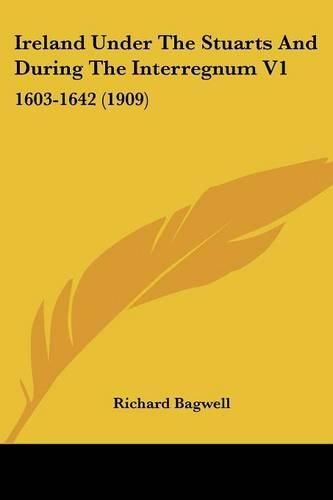Ireland Under the Stuarts and During the Interregnum V1: 1603-1642 (1909)
Richard Bagwell

Ireland Under the Stuarts and During the Interregnum V1: 1603-1642 (1909)
Richard Bagwell
IRELAND UNDER THE STUARTS AND DURING THE INTERREGNUM EICHAED BAGWELL, M. A. AUTHOlt OF lltKLAND UNDIOIi Till- 1 t DOKS VOL. I. 1603-1642 WITH MAP LONGMANS, GREEN, AND CO. 30 PATEKNOSTER ROW, LONDON NKW YORK, BOMBAY, AND OAMUTTA 1 901 All rijiht. 1 rosovvod PEEFACE THESE volumes have been written at such times and seasons as could be made available during an active life in Ireland, and this may induce critics to take a merciful view of their many shortcomings. I have been diligent, but there is still much extant manuscript material which I have been unable to use. Ireland is the laud of violent and persistent party feeling, and no party will be pleased with the present work, for I hold with an ancient critic that the true function of history is to bring out the facts and not to maintain a thesis. If 1 am spared to finish the third volume, it will bring the narrative down to the Revolution, and will contain chapters on the Church or Churches and on the social state of Ireland. The dates of all documents relied on have been given, and unless it is otherwise . stated they are among the Irish State Papers calendared from 1603 to 1660. Many papers, chiefly, but not exclusively, from the Carte manuscripts, were printed by Sir J. T. Gilbert in the c Contemporary History of Affairs in Ireland or in the c History of the Con federation and War in Ireland. As these collections are more generally accessible than the Bodleian Library, I have referred to them as far as they go. The c Aphorismical Discovery, which forms the nucleus of the first, is cited under that title, and the narrative of Sellings in the second under his name. The original Carte papers at Oxford have been often consulted, as wellas the transcripts in the Public Record Gflice, while the manuscripts in the British Museum and in VI PREFACE Trinity College, Dublin, have not been neglected. In the case of old tracts and newsletters, of which I have read a great many, dates and titles are given. The late Lord Ktzwilliain did not consider it consistent with his duty to let Dr. Gardiner see the StrafEord corre spondence preserved at Wentworth Woodhouse, and my application to his successor has also been refused. No restriction seems to have been imposed on the editors of Lauds works, of which the last instalment was published as late as 1860. All the Archbishops letters are printed, Staffords being omitted only because they would have taken too much room. In 1739 Dr. William Knowler, working under Lord Maltons directions, published the well known Strafford Letters, and Mr. Firth has thrown fresh light upon them by printing some of the editors corre spondence in the ninth volume of the Camden Miscellany There is, Knowler wrote, four or five times the number of letters uncopied for one transcribed, and yet. I believe those that shall glean them over again wont find many thing material omitted. Yet Lauds editors thought it worth while to publish a good deal of what had been left out, ana probably there is still something to be done. I have made some examination of the fammus deposi tions in Trinity College, Dublin, concerning lite rebellion of 1641, but it is unnecessary to repeat Miss HirksnnV argil ments, which appear to me conclusive. The documents may be pronounced genuine iu the sense that they really are what they profess to be, but they are all more or loss ex parte statements, and the witnesses wero notmissexamined. Deductions may be made on those grounds, especially in the case of numerical estimates, hut there is a vast mass of other evidence as to the main facts. The matter is discussed pretty fully in Chapter XX. It is vumecessary to describe here the various contem porary histories and memoirs referred to in the text and PREFACE Vii notes. Sir Richard Coxs Hibernia Anglicana should be used with caution. Cox was a strong partisan, but he was not a liar, and he wrote at a time when there were still living witnesses…
This item is not currently in-stock. It can be ordered online and is expected to ship in approx 2 weeks
Our stock data is updated periodically, and availability may change throughout the day for in-demand items. Please call the relevant shop for the most current stock information. Prices are subject to change without notice.
Sign in or become a Readings Member to add this title to a wishlist.


